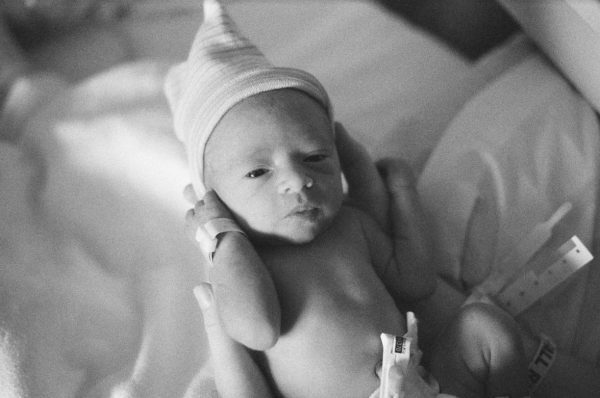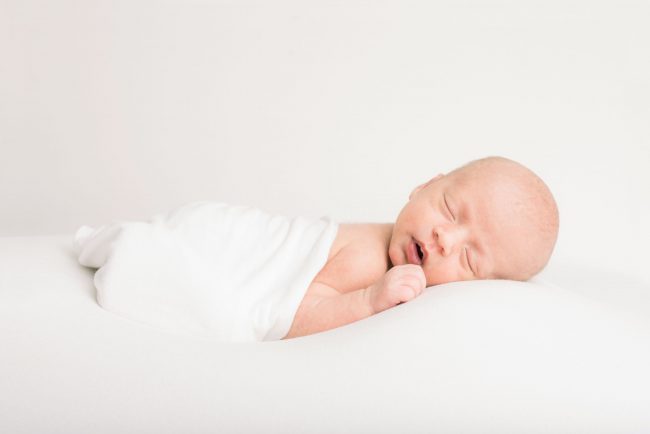By April Wallace, nwaMotherlode contributing writer
It was this time last year that I began to suspect that I was pregnant again. Once the doctor confirmed what I already knew, I was elated not just for my second baby to be on his way, but because she said the magic words, “Do you want to try for a VBAC? You’re a great candidate for it.”
During my first pregnancy, I had researched natural childbirth and hung my hopes on having a vaginal birth one way or another. Instead, my baby was born in what was for me a terrifying emergency c-section. The umbilical cord was around my baby’s neck. It slowed his heartbeat throughout labor until the doctor said she couldn’t wait on me to deliver vaginally. He didn’t have enough oxygen to escape unscathed.
Because of that surgery, my baby Henry was born safely, healthfully and developmentally typical.
The recovery was difficult enough, but the immediate and long lasting guilt I faced was by far the worst part. Visitors would come to our hospital room to meet Henry and get an earful from me, while I tried to justify what happened. It mortified me when people misunderstood the C-section, thinking that it was a conscious choice on my part to benefit my own well-being somehow.

So when my doctor gave me her blessing to try for a VBAC, I’d be lying if I said I wasn’t relieved to have a second chance.
If I could give birth to my second child the way that women have been doing for thousands of years, would that erase the guilt I felt for my first birth?
I did my best to reign that feeling in because I had done so much work to let go of it in the first place.
I told myself often that in all likelihood I could have this baby by C-section too. I was trying to prepare myself for other scenarios so I wouldn’t be set up for disappointment like I was the first time. I continued to check in with the OB about the possibility of a VBAC and each time she confirmed that it was still a valid plan, our first option.
Then at 36 weeks, I had a growth check ultrasound that changed everything.
Through the entire pregnancy, my doctor had been trying to determine whether I was simply having yet another small baby (Henry was 5.5 lbs at birth, full term) or if he was not growing as fast as he should have for some other reason.
At nine months pregnant, they determined he wasn’t getting enough nutrients in the womb and the placenta was no longer useful. It had served its purpose. He’d be better off growing on the outside now, she said. The diagnosis was IUGR, intrauterine growth restriction.
What did that mean for delivery? It was now labeled high risk and the VBAC was no longer a safe option. We had to schedule a C-section after all.
It’s safe to say that from that moment until the birth, I experienced the full range of emotions.
It was not unlike the cycle that I went through following my first C-section, only this time I was able to begin the feelings of guilt before the surgery even happened.
First and foremost, there was fear for my baby’s well being. I had to go in to the clinic every other day for monitoring and with each session, the nurse said, if they didn’t like what they saw, they would send me up to the operating room and take the baby immediately.
The goal was to make it to some point between 37 and 38 weeks, the longer the better. It was looking good because with each monitoring session, they were delightfully surprised by how well he was doing and how strong his heartbeat was despite being so little.
But once I saw my doctor for my weekly visit, she had determined that 38 weeks was no longer a safe bet. She scheduled our surgery for the first day of week 37.
In all honesty, I was so very, very glad that they could tell what my baby needed and when he needed it most. Here I was going along feeling no different than I had the past few weeks when their technology had the power to tell me the truth.
Thank God for that, I thought. It’s what I told every person interested to know how my baby was doing. And it was the truth. Logically, I knew that was the only thing that mattered.
Of course the next thing I felt was relief. Scheduling an operation meant my husband wouldn’t accidentally be stuck in an airport trying to get home from his long distance job while I managed our toddler and endured labor without him.
Someone described what I was going through as the same kind of anxiety that anyone goes through toward the end of their pregnancy, since no one knows when they will go into labor naturally.
How could I describe that it wasn’t like that at all? I had to come to terms with knowing that my body was no longer helpful enough to my baby to continue the pregnancy. I felt like my body was yet again failing my babies, despite being healthy and fit otherwise.
So how would any second time mother sit there with this information and not understand the extent of the situation until baby was delivered? Worrying your butt off every single second is how I handled it.
If we’d been lucky enough to let the pregnancy play out to the point of going into labor naturally, I imagined having only typical, vague worry while packing a bag, sticking it with a birthing ball in the trunk of my car and hoping for the best.
So yes. There was that anger again.
Frustration built after months of anticipation because I would once again not get the opportunity to birth my baby with only my body, my husband and a doctor to assist.
Anger seethed through me because after another 9 months of staying strong, healthy and active, it still couldn’t prove itself. I really thought of it more highly. Deep down I felt like it was truly strong enough, like it could really do this. But we’ll never know, I thought.
Of course the true issue was not my body’s ability. The pressure of labor would cause even less blood, oxygen and nutrients to make it to my baby, which no one wanted since he wasn’t getting enough in the first place.
But reasoning had nothing to do with my feelings.
I worried that my overactive attention to not gaining too much weight could have affected my baby negatively. But my doctor assured me otherwise, saying that my weight gain was just right to support a baby and the IUGR was no fault of mine. In most cases doctors do not find the cause, she said. They only use the diagnosis to find a way to help the baby and his mother.
That allowed my worry to morph into a different kind of fear once again. She prepared me for the very real possibility that my baby would be born with a couple of deficits, since he would be three weeks early. We were told that he may need some assistance breathing, since the lungs are the last to fully develop. She also reminded me that breastfeeding may be more difficult to begin this time if his jaw was not formed well enough.
I turned my nervous anticipation into preparation, got a good 5 hours of sleep and arrived with my husband to the hospital on the morning of Wednesday, January 23.
We checked in and joked with the nurses who took care of us, laughed and assured each other in the various preparation rooms, and arrived to the OR entirely differently than we had the last time we were there.
The medical students listened closely as the anesthesiologist explained what they were there to observe. They looked at my body as if I wasn’t even in the room, and oddly that gave me peace.
Everyone else in the room enjoyed the music coming from an overhead speaker and chatted with their coworkers about what they were going to do that weekend. One of the nurses made light conversation with me and asked me if I’d like to change the music.
There was no emergency here, this was a routine Wednesday. Kids who will one day be doctors were benefiting from our experience. Doctors who did this all the time saw nothing particularly pressing about our case. What a comfort we were afforded in that way.
During the birth, I didn’t feel nearly as much tugging and uncomfortable pressure from hands and instruments than I did the first time around because I had a spinal instead of an epidural.
When they held up our baby, Elliott Wallace, my husband saw him and let out a happy little cry. He was perfect, he said. Born 5 lbs even and 18 inches long, with brown hair and blue eyes.

Elliott cried only until they placed him on my chest. Then he instantly calmed down and got quiet. He needed no assistance with breathing and took to feeding very well.
We had come to the hospital with two middle names that we were considering—Grey and Reid. We waited to meet him face to face before deciding between them. The next morning, we agreed that he was definitely a Reid. He’s a peaceful, easygoing little baby content just to be near us and hardly ever fussy. We saw that right away.
We went home only two days after birth. By then I still had some sadness in my heart for not delivering him the way I wanted, but it was already increasingly difficult to feel that. Quickly taking its place was overwhelming joy and relief for how well our baby was doing despite it all.

 April Wallace is a stepmom to one smart, funny teenager, mama to two beautiful and curious baby boys and wife to a very kind and generous man. She spent the past decade as a news reporter, sometimes lifestyle writer, and recently left her job at the Arkansas Democrat-Gazette to be with her babies while they’re still babies. When she gets a few minutes to herself, April loves to run local trails and read fiction.
April Wallace is a stepmom to one smart, funny teenager, mama to two beautiful and curious baby boys and wife to a very kind and generous man. She spent the past decade as a news reporter, sometimes lifestyle writer, and recently left her job at the Arkansas Democrat-Gazette to be with her babies while they’re still babies. When she gets a few minutes to herself, April loves to run local trails and read fiction.
